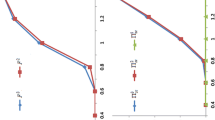Abstract
In practice, a supplier often offers its retailers a permissible delay period M to settle their unpaid accounts. Likewise, a retailer in turn offers another trade credit period N to its customers. The benefits of trade credit are not only to attract new buyers who consider it a type of price reduction, but also to provide a competitive strategy other than introduce permanent price reductions. On the other hand, the policy of granting credit terms adds an additional cost to the seller as well as an additional dimension of default risk. In this paper, we first incorporate the fact that trade credit has a positive impact on demand but negative impacts on costs and default risks to establish an economic order quantity model for the seller in a supply chain with up-stream and down-stream trade credits. Then we derive the necessary and sufficient conditions to obtain the optimal replenishment time and credit period for the seller. Finally, we use some numerical examples to illustrate the theoretical results.
Similar content being viewed by others
References
Abad P.L., Jaggi C.K.: A joint approach for setting unit price and the length of the credit period for a seller when end demand is price sensitive. Int. J. Prod. Econ. 83, 115–122 (2003)
Aggarwal S.P., Jaggi C.K.: Ordering policies of deteriorating items under permissible delay in payments. J. Oper. Res. Soc. 46, 658–662 (1995)
Brigham E.F.: Fundamentals of Financial Management. The Dryden Press, Florida (1995)
Chang C.T., Ouyang L.Y., Teng J.T.: An EOQ model for deteriorating items under supplier credits linked to ordering quantity. Appl. Math. Model. 27, 983–996 (2003)
Chang C.T., Teng J.T.: Retailer’s optimal ordering policy under supplier credits. Math. Method. Oper. Res. 60, 471–483 (2004)
Chung, K.J.: A theorem on the determination of economic order quantity under conditions of permissible delay in payments. Comput. Oper. Res. 25, 49–52 (1998)
Chung K.J., Huang Y.F.: The optimal cycle time for EPQ inventory model under permissible delay in payments. Int. J. Prod. Econ. 84, 307–318 (2003)
Chung K.J., Liao J.J.: Lot-sizing decisions under trade credit depending on the order quantity. Comput. Oper. Res. 31, 909–928 (2004)
Dave U.: Letters and viewpoints on“ Economic order quantity under conditions of permissible delay in payments”. J. Oper. Res. Soc. 46, 1069–1070 (1985)
Goyal S.K.: Economic order quantity under conditions of permissible delay in payments. J. Oper. Res. Soc. 36, 335–338 (1985)
Goyal S.K., Teng J.T., Chang C.T.: Optimal ordering policies when the supplier provides a progressive interest-payable scheme. Eur. J. Oper. Res. 179, 404–413 (2007)
Huang Y.F.: Optimal retailer’s ordering policies in the EOQ model under trade credit financing. J. Oper. Res. Soc. 54, 1011–1015 (2003)
Huang Y.F.: retailer’s replenishment policy for the EPQ model under the supplier’s trade credit policy. Prod. Plan. Control 15, 27–33 (2004)
Huang Y.F.: Economic order quantity under conditionally permissible delay in payments. J. Oper. Res. Soc. 176, 911–924 (2007)
Huang Y.F., Hsu K.H.: An EOQ model under retailer partial trade credit policy in supply chain. Int. J. Prod. Eco. 112, 655–664 (2008)
Hwang H., Shinn S.W.: Retailer’s pricing and lot sizing policy for exponentially deteriorating products under the condition of permissible delay in payments. Comput. Oper. Res. 24, 539–547 (1997)
Jaggi C.K., Goyal S.K., Goel S.K.: Retailer’s optimal replenishment decisions with credit-linked demand under permissible delay in payments. Eur. J. Oper. Res. 190, 130–135 (2008)
Jamal A.M.M., Sarker B.R., Wang S.: An ordering policy for deteriorating items with allowable shortages and permissible delay in payment. J. Oper. Res. Soc. 48, 826–833 (1997)
Jaruphongsa W., Lee C.Y.: Dynamic lot-sizing problem with demand time windows and container-based transportation cost. Optim. Lett. 2(1), 39–51 (2008)
Liao H.C., Tsai C.H., Su C.T.: An inventory model with deteriorating items under inflation when a delay in payment is permissible. Int. J. Prod. Econ. 63, 207–214 (2000)
Migdalas A., Baourakis G., Pardalos P.M.: Supply Chain and Finance. World Scientific, Singapore (2004)
Ouyang L.Y., Chang C.T., Teng J.T.: An EOQ model for deteriorating items under trade credits. J. Oper. Res. Soc. 56, 719–726 (2005)
Ouyang L.Y., Teng J.T., Chen L.H.: Optimal ordering policy for deteriorating items with partial backlogging under permissible delay in payments. J. Glob. Optim. 34, 245–271 (2006)
Pardalos P.M., Tsitsiringos V.: Financial Engineering, Supply Chain and E-commerce. Kluwer, Boston (2002)
Shah N.H.: Probabilistic time-scheduling model for an exponentially decaying inventory when delay in payment is permissible. Int. J. Prod. Econ. 32, 77–82 (1993)
Sharma S.: A composite model in the context of a production-inventory system. Optim. Lett. 3(2), 239–251 (2009)
Shinn S.W., Hwang H.: Optimal pricing and ordering policies for retailers under order-size dependent delay in payments. Comput. Oper. Res. 30, 35–50 (2003)
Teng J.T.: On the economic order quantity under conditions of permissible delay in payments. J. Oper. Res. Soc. 53, 915–918 (2002)
Teng J.T., Chang C.T.: Optimal manufacturer’s replenishment policies in the EPQ model under two levels of trade credit policy. Eur. J. Oper. Res. 195, 358–363 (2009)
Teng J.T., Chang C.T., Chern M.S., Chan Y.L.: Retailer’s optimal ordering policies in the EOQ models with trade credit financing. Int. J. Syst. Sci. 38, 269–278 (2007)
Teng J.T., Chang C.T., Goyal S.K.: Optimal pricing and ordering policy under permissible delay in payments. Int. J. Prod. Econ. 97, 121–129 (2005)
Teng J.T., Goyal S.K.: Optimal ordering policies for a retailer in a supply chain with up-stream and down-stream trade credits. J. Oper. Res. Soc. 58, 1252–1255 (2007)
Teng J.T., Ouyang L.Y., Chen L.H.: Optimal manufacturer’s pricing and lot-sizing policies under trade credit financing. Int. Trans. Oper. Res. 13, 515–528 (2006)
Author information
Authors and Affiliations
Corresponding author
Rights and permissions
About this article
Cite this article
Teng, JT., Lou, KR. Seller’s optimal credit period and replenishment time in a supply chain with up-stream and down-stream trade credits. J Glob Optim 53, 417–430 (2012). https://doi.org/10.1007/s10898-011-9720-3
Received:
Accepted:
Published:
Issue Date:
DOI: https://doi.org/10.1007/s10898-011-9720-3




